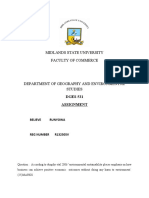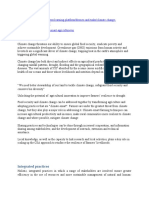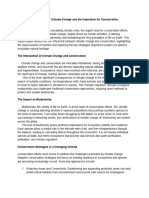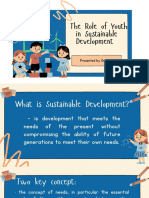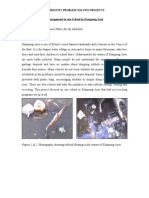Professional Documents
Culture Documents
Sds
Sds
Uploaded by
Deftu Andrei Razvan0 ratings0% found this document useful (0 votes)
11 views1 pageThe document discusses the importance of environmental conservation and sustainable development given mounting environmental crises. It notes that traditional models of economic growth have prioritized short-term gains over long-term sustainability. Sustainable development seeks to meet current needs without compromising future generations' ability to meet their own needs by integrating environmental considerations across all sectors. Central to sustainable development is conservation of natural habitats, biodiversity, and mitigating human impacts on the environment through protected areas and transitioning to renewable energy and efficient resource management.
Original Description:
Copyright
© © All Rights Reserved
Available Formats
TXT, PDF, TXT or read online from Scribd
Share this document
Did you find this document useful?
Is this content inappropriate?
Report this DocumentThe document discusses the importance of environmental conservation and sustainable development given mounting environmental crises. It notes that traditional models of economic growth have prioritized short-term gains over long-term sustainability. Sustainable development seeks to meet current needs without compromising future generations' ability to meet their own needs by integrating environmental considerations across all sectors. Central to sustainable development is conservation of natural habitats, biodiversity, and mitigating human impacts on the environment through protected areas and transitioning to renewable energy and efficient resource management.
Copyright:
© All Rights Reserved
Available Formats
Download as TXT, PDF, TXT or read online from Scribd
Download as txt, pdf, or txt
0 ratings0% found this document useful (0 votes)
11 views1 pageSds
Sds
Uploaded by
Deftu Andrei RazvanThe document discusses the importance of environmental conservation and sustainable development given mounting environmental crises. It notes that traditional models of economic growth have prioritized short-term gains over long-term sustainability. Sustainable development seeks to meet current needs without compromising future generations' ability to meet their own needs by integrating environmental considerations across all sectors. Central to sustainable development is conservation of natural habitats, biodiversity, and mitigating human impacts on the environment through protected areas and transitioning to renewable energy and efficient resource management.
Copyright:
© All Rights Reserved
Available Formats
Download as TXT, PDF, TXT or read online from Scribd
Download as txt, pdf, or txt
You are on page 1of 1
In an era marked by escalating environmental crises and mounting concerns over
climate change, the imperative for environmental conservation and sustainable
development has never been more urgent. From deforestation and habitat loss to
pollution and biodiversity decline, human activities are exacting a heavy toll on
the planet's ecosystems, jeopardizing the well-being of present and future
generations.
At the heart of the challenge lies the need to reconcile economic development with
environmental preservation. Traditional models of growth have often prioritized
short-term gains over long-term sustainability, leading to the depletion of natural
resources and the degradation of ecosystems. However, there is growing recognition
that economic prosperity must be pursued in harmony with environmental stewardship
to ensure the resilience and vitality of the planet.
Sustainable development offers a holistic approach to addressing this conundrum,
seeking to meet the needs of the present without compromising the ability of future
generations to meet their own needs. This entails integrating environmental
considerations into decision-making processes across sectors, from energy and
transportation to agriculture and urban planning. By adopting sustainable practices
and technologies, societies can reduce their ecological footprint and transition
towards more resilient and regenerative systems.
Central to the concept of sustainable development is the principle of conservation,
which entails safeguarding natural habitats, preserving biodiversity, and
mitigating the impacts of human activities on the environment. Protected areas such
as national parks and marine reserves play a crucial role in conserving
biodiversity and providing ecosystem services essential for human well-being, such
as clean air, fresh water, and climate regulation.
Moreover, sustainable development requires a shift towards renewable energy sources
and efficient resource management practices to reduce greenhouse gas emissions and
mitigate climate change. Investing in clean energy infrastructure, promoting energy
efficiency, and transitioning towards a circular economy that minimizes waste and
maximizes resource reuse are essential steps towards building a more sustainable
future.
In conclusion, environmental conservation and sustainable development are
inextricably linked, offering a pathway towards a more equitable, prosperous, and
resilient future for all. By embracing a holistic approach that values the
intrinsic worth of nature and prioritizes the well-being of both people and the
planet, we can forge a more sustainable path forward and ensure a legacy of
stewardship for generations to come.
You might also like
- Civil Engineering Sustainability and The FutureDocument37 pagesCivil Engineering Sustainability and The FutureJohn Nelson Lorenzo100% (8)
- Lesson 8 - Proper Waste Disposal - ZionDocument42 pagesLesson 8 - Proper Waste Disposal - ZionZionjoy Vega81% (36)
- Sustainable FutureDocument3 pagesSustainable FutureJasonNo ratings yet
- Essay 2Document1 pageEssay 2movieexclusive02No ratings yet
- HealthDocument1 pageHealthqwdfv943No ratings yet
- Nurturing EnvironmentDocument2 pagesNurturing Environmentlozaha70No ratings yet
- The Concept of SustainabilityDocument4 pagesThe Concept of Sustainabilityaranisl254No ratings yet
- Towards A Greener Future Environmental AdvancementsDocument1 pageTowards A Greener Future Environmental AdvancementsJaNo ratings yet
- ENVIRONMENTDocument3 pagesENVIRONMENTcloudberryariyannaNo ratings yet
- Ecological SustainabilityDocument2 pagesEcological Sustainabilitybiel-joga101No ratings yet
- 4Document1 page4Alex MorozovNo ratings yet
- EnvironmentDocument3 pagesEnvironmentOlga SavchenkoNo ratings yet
- Environment Conservation - ArticleDocument2 pagesEnvironment Conservation - ArticleSumit GunjanNo ratings yet
- EnvironmentDocument2 pagesEnvironmentMkwNo ratings yet
- Land SolutionsDocument3 pagesLand SolutionsVeerendra Kumar ManemNo ratings yet
- Introduction To Environment ManagementDocument10 pagesIntroduction To Environment ManagementItisshatakshiNo ratings yet
- Environmental Challenges and SolutionsDocument4 pagesEnvironmental Challenges and Solutionspaulngotoku.95No ratings yet
- ComprehensionDocument4 pagesComprehensionMuhayr ManzoorNo ratings yet
- Climate Change and Biodiversity Navigating The Interconnected Challenges of A Changing PlanetDocument21 pagesClimate Change and Biodiversity Navigating The Interconnected Challenges of A Changing PlanetAthar ShaikhNo ratings yet
- Challenges and Solutions Navigating The Complexities of Environmental ConservationDocument1 pageChallenges and Solutions Navigating The Complexities of Environmental Conservationoxycan 111No ratings yet
- TCS EssayDocument4 pagesTCS Essayswin0897.eduNo ratings yet
- EnvDocument2 pagesEnvqwdfv943No ratings yet
- New Text DocumentDocument1 pageNew Text DocumentphungvuquanganhNo ratings yet
- PeDocument2 pagesPekanishkmodi31No ratings yet
- Title - Environmental Sustainability - Nurturing Our Planet For Future GenerationsDocument2 pagesTitle - Environmental Sustainability - Nurturing Our Planet For Future GenerationssharonNo ratings yet
- The Urgency of Environmental ConservationDocument1 pageThe Urgency of Environmental Conservationrencevelasco80No ratings yet
- The Role of Renewable Energy in Combating Climate ChangeDocument2 pagesThe Role of Renewable Energy in Combating Climate Changefritzjhone8No ratings yet
- English PTDocument1 pageEnglish PTRhian Joy Balantac DaguioNo ratings yet
- SustainabilityDocument2 pagesSustainabilityolivererasmo21No ratings yet
- Economics Holiday HomeworkDocument5 pagesEconomics Holiday HomeworkleishaivoryNo ratings yet
- Abstract 1Document2 pagesAbstract 1Julio DavidNo ratings yet
- The Urgent Need For Environmental ActionDocument10 pagesThe Urgent Need For Environmental Actionayankashif.3096No ratings yet
- A Holistic Approach To Tackling The Climate CrisisDocument2 pagesA Holistic Approach To Tackling The Climate Crisism-10325855No ratings yet
- Essay 1Document2 pagesEssay 1diveshmistry73No ratings yet
- ADocument1 pageAAlex MorozovNo ratings yet
- Life On EarthDocument2 pagesLife On Earthmmoussiden5No ratings yet
- TheDocument1 pageThegiovanni wray estranoNo ratings yet
- Environmental ConservationDocument2 pagesEnvironmental ConservationAdrien TelloNo ratings yet
- EVSDocument2 pagesEVSMansi JadhavNo ratings yet
- The Importance of Environmental ConservationDocument3 pagesThe Importance of Environmental Conservationjashanvipan1290No ratings yet
- The Importance of Environmental ConservationDocument1 pageThe Importance of Environmental ConservationlihasadsNo ratings yet
- Tài liệu ngày 10032024 EnvironmentDocument5 pagesTài liệu ngày 10032024 Environmentdungnhm25062005No ratings yet
- Essay On The Importance of Environmental SustainabilityDocument1 pageEssay On The Importance of Environmental SustainabilityZABLON MUTHOKANo ratings yet
- Environmental ConservationDocument3 pagesEnvironmental Conservationarefehsw7No ratings yet
- Asira KevinDocument5 pagesAsira KevinGift NanoNo ratings yet
- Enviroment HiraneshDocument9 pagesEnviroment HiraneshRAJKUMAR A/L PALMANAPHAN MoeNo ratings yet
- Environmental Conservation Is Crucial For The Sustainability of Our PlanetDocument1 pageEnvironmental Conservation Is Crucial For The Sustainability of Our PlanetMkwNo ratings yet
- The Role of Renewable Energy in Combating Climate ChangeDocument2 pagesThe Role of Renewable Energy in Combating Climate Changejanvi84No ratings yet
- Midlands State University Faculty of Commerce: DGES 531 AssignmentDocument6 pagesMidlands State University Faculty of Commerce: DGES 531 Assignmentbelieve runyowaNo ratings yet
- Assessment4 Assignment M2 6%Document2 pagesAssessment4 Assignment M2 6%John Benjamin DulayNo ratings yet
- CC NotesDocument6 pagesCC NotesKumar Malleswar VujjiNo ratings yet
- Climate Change Feature SampleDocument3 pagesClimate Change Feature Sampleallabouthaikyuu123No ratings yet
- Num 4Document1 pageNum 4Mandy LeeNo ratings yet
- Green RootsDocument10 pagesGreen RootsMahad IlyasNo ratings yet
- Protecting The Environment Full PaperDocument2 pagesProtecting The Environment Full PaperNguyễn AnhNo ratings yet
- Essay 1 - SustainabilityDocument1 pageEssay 1 - SustainabilityKenneth The GreatNo ratings yet
- NR - EE Chapter IIDocument11 pagesNR - EE Chapter IIGetachew GurmuNo ratings yet
- Wepik Adapting To The Anthropogenic Impact Addressing Climate Change 20240304073012HDgjDocument12 pagesWepik Adapting To The Anthropogenic Impact Addressing Climate Change 20240304073012HDgjsachdevarudra71No ratings yet
- Bài Luận Về Chủ Đề "REGENERATION" ASEP Seedling "Document6 pagesBài Luận Về Chủ Đề "REGENERATION" ASEP Seedling "Vương Tiến ĐạtNo ratings yet
- Research Paper Sustainable Management of Natural ResourcesDocument1 pageResearch Paper Sustainable Management of Natural ResourcesrishNo ratings yet
- Eco Issues and Their Possible SolutionsDocument5 pagesEco Issues and Their Possible SolutionsMunteanu DanielNo ratings yet
- Dumpster Diving in London An Ultimate Guide - MoDocument2 pagesDumpster Diving in London An Ultimate Guide - Mobelleoftheball2211No ratings yet
- InglesDocument9 pagesInglesstella gomezNo ratings yet
- Corporate Sustainability Reporting: The Case of The Banking IndustryDocument32 pagesCorporate Sustainability Reporting: The Case of The Banking IndustryRubel SahaNo ratings yet
- PU Exam Sample QPDocument2 pagesPU Exam Sample QPVishal PandeyNo ratings yet
- Notes On SustainableDocument28 pagesNotes On SustainableRajendra KunwarNo ratings yet
- DLL - Science 5 - Q1 - W7Document4 pagesDLL - Science 5 - Q1 - W7Anne RenaeNo ratings yet
- Sustainable Development - Wikipedia, The Free EncyclopediaDocument22 pagesSustainable Development - Wikipedia, The Free EncyclopediaŚáńtőśh Mőkáśhí100% (1)
- In Search Of-Fashions-Sustainability-SeekersDocument8 pagesIn Search Of-Fashions-Sustainability-Seekerserinnaagnes05No ratings yet
- Sreedev - Sustainable Lifestyle Assessment and Behavioural Modification at HouseholdDocument13 pagesSreedev - Sustainable Lifestyle Assessment and Behavioural Modification at HouseholdSree DevNo ratings yet
- The Role of Youth in Sustainable DevelopmentDocument12 pagesThe Role of Youth in Sustainable DevelopmentAlthea GacilanNo ratings yet
- Clock Shadow Building: Presented By-Suman MauryaDocument11 pagesClock Shadow Building: Presented By-Suman MauryaSuman100% (1)
- Ricafort, Mariel Activity2Document8 pagesRicafort, Mariel Activity2Claret AmorNo ratings yet
- Project SustainabilityDocument19 pagesProject Sustainabilitynwilliam868No ratings yet
- Unit - 2 Swachh Bharat - Rural and Urban FacetsDocument8 pagesUnit - 2 Swachh Bharat - Rural and Urban FacetsSpartazone gamingNo ratings yet
- Project O - Garbage Management in KG AyerDocument3 pagesProject O - Garbage Management in KG Ayerapi-385884967% (3)
- Level of Information and Education Campaign On Solid Waste Management and Household Practices On Solid Waste Disposal in Butuan CityDocument2 pagesLevel of Information and Education Campaign On Solid Waste Management and Household Practices On Solid Waste Disposal in Butuan CityMary Annjelou MontefalconNo ratings yet
- EST Microproject E-WASTEDocument15 pagesEST Microproject E-WASTEJAYESHNo ratings yet
- EcoSort ResearchDocument12 pagesEcoSort ResearchvisorioralphlorenzoNo ratings yet
- Creduce Introduction 2024Document14 pagesCreduce Introduction 2024shailaquarious85No ratings yet
- The Rise of Renewable Energy A Sustainable FutureDocument1 pageThe Rise of Renewable Energy A Sustainable FuturetdctopNo ratings yet
- ESS Powerpoint RevisedDocument23 pagesESS Powerpoint Revisedshadow gamingNo ratings yet
- 3r ConceptDocument8 pages3r Conceptsahana2904No ratings yet
- Environmental ConservationDocument10 pagesEnvironmental ConservationInsanewarriorkaran KaranNo ratings yet
- Understanding EcotourismDocument5 pagesUnderstanding EcotourismTalidaNo ratings yet
- RRL Food Quality and PackagingDocument2 pagesRRL Food Quality and PackagingflwrbtchNo ratings yet
- EntrepDocument1 pageEntrepEats FoodieNo ratings yet
- Pengelolaan Sampah Di Kota Pekanbaru: Ernawaty, Zulkarnain, Yusni Ikhwan Siregar, BahruddinDocument10 pagesPengelolaan Sampah Di Kota Pekanbaru: Ernawaty, Zulkarnain, Yusni Ikhwan Siregar, BahruddinIsma MadaraNo ratings yet
- Sustainable Supply Chain Management at MahindraDocument3 pagesSustainable Supply Chain Management at MahindraShivam ChandraNo ratings yet

















































